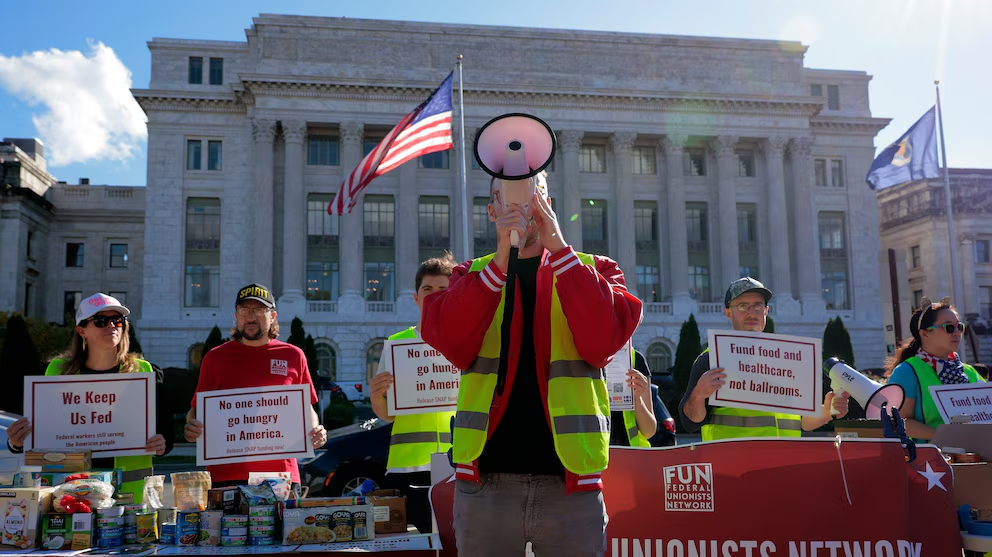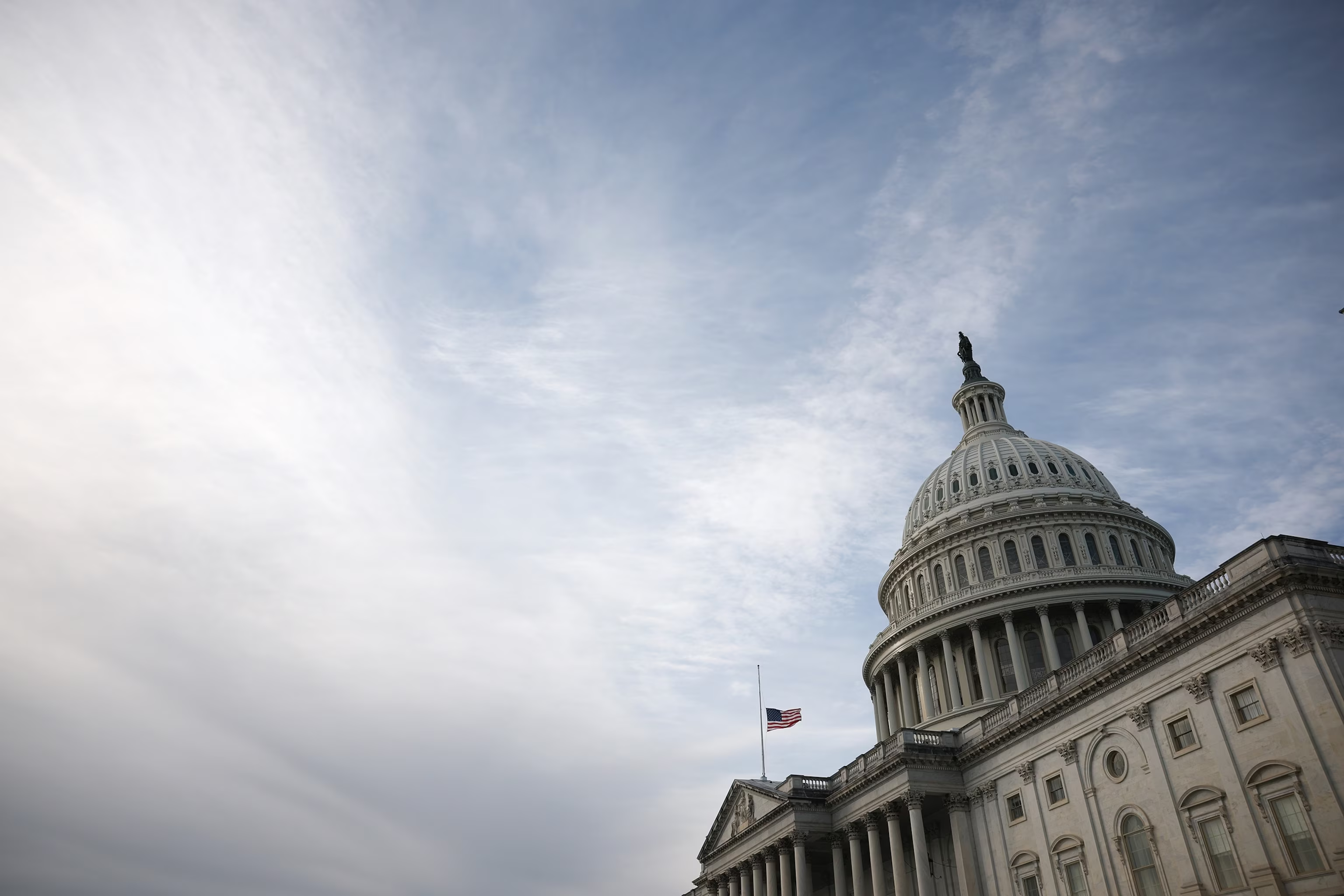“3:43 Members of the Federal Trade Union Network and other unions and activist groups rally and hold a food drive in front of the Department of Agriculture on the National Trade Center during the 30th day of the federal government shutdown, October 30, 2025, in Washington, DC. Religious leaders, food bank workers and fired federal employees who have demanded that the Trump administration release […]”, — write: businessua.com.ua

3:43 Members of the Federal Trade Union Network and other unions and activist groups rally and hold a food drive in front of the Department of Agriculture on the National Trade Center during the 30th day of the federal government shutdown, October 30, 2025, in Washington, DC. Religious leaders, food bank workers and fired federal employees who demanded the Trump administration release $6 billion in emergency funds for the Program Supplemental Nutrition Assistance Program (SNAP), which helps 42 million people pay for groceries each month. Chip Somodevilla/Getty Images
The longest government shutdown in U.S. history could end as soon as Wednesday, bringing hundreds of thousands of federal employees back to work, funding food stamps and eliminating major travel. failures
Analysts told ABC News that the reopening averts a recession that could occur in the event of a prolonged shutdown lasting weeks or months.
Federal worker payback and recovery Analysts say SNAP benefits offset most of the economic damage caused by the shutdown. Still, they added, the two-month resolution passed by the Senate risks future losses if a second shutdown begins early next year.
The shutdown comes at a delicate time for the nation’s economy, as the hiring slowdown stokes fears of a recession and inflation proving difficult to fully contain.
“If the government opens up and people go back to work, it will prevent what would otherwise be a pretty severe downturn in the economy,” Gerald Epstein, an economics professor at the University of Massachusetts, told ABC News. “In January, we could be in the same mess again.”
The Senate passed the short-term government funding bill on Monday and sent it to the House of Representatives, where a vote could take place as early as Wednesday. The bill provides funding for the government until January 30 and funding for some government agencies until the end of the fiscal year.
The economic damage during the government shutdown has focused largely on unpaid government workers who have cut back or cut spending, hurting nearby businesses, some economists say.
Many federal employees deemed nonessential were furloughed without pay during the shutdown, while others, such as air traffic controllers, were forced to work without pay. The Bank of America Institute found that during the most recent shutdowns, the total number of workers who quit was about 800,000.
The loss of wages took a heavy toll on the economy, amounting to a loss of 0.8% or $55 billion in annual gross domestic product in the current quarter, Gregory Dako, chief economist at accounting firm EY, told ABC News. For reference, in the first half of 2025 the economy grew an average of 1.6% year-on-year, meaning the shutdown wiped out growth equivalent to about half of the growth achieved in the previous six months.

The US Capitol, November 11, 2025 on Capitol Hill in Washington, DC.Win Mcnamee/Getty Images
“It’s good for us that this very large employer in the US is now paying its workers again. It will help,” Erica Groschen, senior economic adviser at Cornell University and former commissioner of the Bureau of Labor Statistics under President Barack Obama, told ABC News.
The suspension of SNAP payments this month and major disruptions in air travel have also hampered the economy. An estimated 42 million recipients depend on Supplemental Nutrition Assistance Program benefits, which in turn boosts the business of local grocers. According to some analysts, more than 3 million passengers fly every day, and about one in five of them travel on business, meaning that disruptions are disrupting businesses across the economy.
“Airline disruptions were on the rise,” Daco said. “It’s an important part of the economy.”
The end of the government shutdown will also allow the federal government to resume collecting and releasing key government data, including monthly inflation and hiring reports that are closely watched by policymakers, Groshen said.
The Federal Reserve is set to make a decision on the level of interest rates early next month.
“When we get government back up and running, we will reduce the uncertainty around which many decisions are made,” Groschen said.
An end to the government shutdown will quickly remove most of the economic damage, as laid-off workers are expected to spend on wages and SNAP recipients will likely rush to make up for any food shortages in households, Jeffrey Campbell, a professor of economics at the University of Notre Dame and a former senior economist at the Federal Reserve Bank of Chicago, told ABC News.
Some federal workers likely took out loans to fill the pay gap, i.e. dose resolution prefers them to settle their creditors and smoothly maintain typical spending levels, Campbell added.
“Everyone understood that workers who showed up for work would eventually get paid,” Campbell said. “It prevented the damage.”
While several economists have warned of a possible recession if the shutdown continues, Campbell downplayed the possibility, saying the economy would likely remain relatively weak.
A recession, he said, would be “an improbable event piled on top of another improbable one.”
The 60-40 Senate vote in favor of reopening the government included three full-year appropriations bills, including funding for SNAP benefits. But government funding will run out on January 30, leaving open the possibility of another shutdown.
Some analysts warn that a potential repeat of the shutdown could put the U.S. on the brink of another round of recession. failure.
“The crisis is not over,” Epstein said. “It’s just a pause.”
ABC News’ Kevin Shalvey and Alexandra Hutzler contributed to this report.
Source: abcnews.go.com
Please wait…
